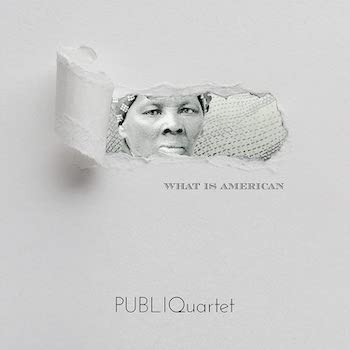Classical Album Review: What Is American — PUBLIQuartet
By Jonathan Blumhofer
American-ness in music is impossible to define and constantly in flux, yet the threads that connect it all together — at once beautiful, tragic, humorous, ironic, whimsical — are all somehow recognizable.
 The question of what makes music American is an old one and particularly charged of late. So it’s heartening to see (and hear) it addressed so thoroughly, inventively, and successfully by PUBLIQuartet on their new disc, What Is American.
The question of what makes music American is an old one and particularly charged of late. So it’s heartening to see (and hear) it addressed so thoroughly, inventively, and successfully by PUBLIQuartet on their new disc, What Is American.
As often seems to happen with string quartets when they tackle issues of American-ness and the repertoire, Antonin Dvorak’s F-major “American” String Quartet looms large. Here, though, the ensemble takes a refreshing and wholly unpredictable tack, namely improvising their own version of this 1893 favorite. The effort is at once a fascinating deconstruction of the original and a gripping homage to its source materials.
Surely, despite Dvorak’s position as a leading figure (and role model) in the turn-of-the-20th-century symphonic repertoire, few today think of his music as having any major connection to trends in contemporary music. Yet the way PUBLIQuartet navigates between skittering aleatoric figurations and arpeggios and the familiar pulsing riffs at the start of the “American” Quartet’s first movement may well have you rethinking the distance between the standard canon and the avant-garde. As well you should.
In fact, their whole arrangement of the piece (and, at base, that’s really what this is), is similarly gleeful in its breakdown of barriers between the European classical tradition and American vernacular forms like blues, jazz, and folk song. Sometimes — like in the second movement, with its bent notes, quarter tones, and discreet embellishments that almost sound like a muezzin’s call to prayer — the approach is revelatory. Others, like the looping gestures in the Scherzo, are less foundation-rocking; some, though (say the jamming apex of the finale), are sheer joy.
Taken together, PUBLIQuartet’s is a rethinking of this classic piece that both pays tribute to the music’s underlying sources and, paradoxically, reinforces the emotional and structural strengths of the original. Any way you might like to measure it, then, their feat is impressive.
The rest of the album lives up to this standard.
Vijay Iyer’s Dig the Say is a thoroughly engaging, 10-minute-long riff-driven essay that mixes, in more-or-less equal measure, grit, vigor, and joy. Roscoe Mitchell’s quasi-Ivesian CARDS 11-11-2020 is its lyrical — but highly fragmented and harmonically pungent — counterbalance.
Further arrangements of songs fill out the album. There’s a set of four collected under the heading “Wild Women” — Tina Turner’s “Black Coffee,” Betty Davis’s “They Say I’m Different,” Alice Coleman’s “Er Ra,” and Ida Cox’s “Wild Women Don’t Get the Blues” — that match, for intensity and drive, the boldest moments in the Iyer and Mitchell works.
Most affecting is Rhiannon Giddens’s “At the Purchaser’s Option,” a meditation on a horrifying 1830s advertisement about the sale of a young Black woman and her infant. Improvisations on Fats Waller’s “Honeysuckle Rose” and Ornette Coleman’s “Law Years and Street Woman” complete the disc.
At the end of it, perhaps, PUBLIQuartet hasn’t conclusively answered the question the album poses. But maybe that’s the point: American-ness in music is impossible to define and constantly in flux, yet the threads that connect it all together — at once beautiful, tragic, humorous, ironic, whimsical — are all somehow recognizable.
Jonathan Blumhofer is a composer and violist who has been active in the greater Boston area since 2004. His music has received numerous awards and been performed by various ensembles, including the American Composers Orchestra, Kiev Philharmonic, Camerata Chicago, Xanthos Ensemble, and Juventas New Music Group. Since receiving his doctorate from Boston University in 2010, Jon has taught at Clark University, Worcester Polytechnic Institute, and online for the University of Phoenix, in addition to writing music criticism for the Worcester Telegram & Gazette.
